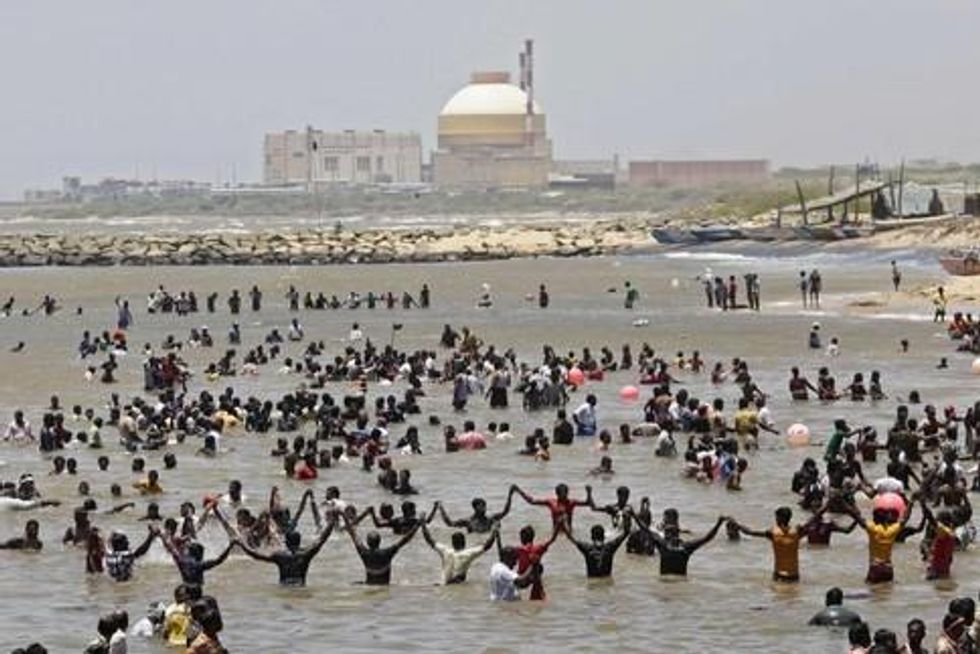

SUBSCRIBE TO OUR FREE NEWSLETTER
Daily news & progressive opinion—funded by the people, not the corporations—delivered straight to your inbox.
5
#000000
#FFFFFF
To donate by check, phone, or other method, see our More Ways to Give page.


Daily news & progressive opinion—funded by the people, not the corporations—delivered straight to your inbox.

Despite years of opposition and protest from local residents, India opened its largest nuclear power plant on Tuesday in the southeastern state of Tamil Nadu on a stretch of coast slammed by a 2004 tsunami.
The joint Indo-Russian Kudankulam Nuclear Power Plant opened at the tail-end of Indian Prime Minister Manmohan Singh's visit to Russia. Nuclear Power Corporation of India Ltd., which, according to Bloomberg, is the country's only atomic energy producer, started up part of one of its reactors worth $2.84 billion on Tuesday.
The opening moved forward despite a thousands-strong protest over the weekend in which over 200 people were arrested.
The plant, which was planned in 1988 and started undergoing construction in 1997, has faced a series of delays due to protests from local communities concerned that it will ruin the Bay of Bengal ecosystem and devastate the local fishing economy, AsiaNews reports.
Protests increased in intensity and regularity following the tsunami-sparked meltdown and ongoing disaster at the Fukushima nuclear plant in Japan.
To mark the second anniversary of the Fukushima meltdown in March 2013, 600 boats filled with 4,000 workers in the fishing industry waved black flags in the sea behind the Kudankulam plant.
Despite widespread concerns, Singh has vowed to drastically expand nuclear power in India.
Dear Common Dreams reader, The U.S. is on a fast track to authoritarianism like nothing I've ever seen. Meanwhile, corporate news outlets are utterly capitulating to Trump, twisting their coverage to avoid drawing his ire while lining up to stuff cash in his pockets. That's why I believe that Common Dreams is doing the best and most consequential reporting that we've ever done. Our small but mighty team is a progressive reporting powerhouse, covering the news every day that the corporate media never will. Our mission has always been simple: To inform. To inspire. And to ignite change for the common good. Now here's the key piece that I want all our readers to understand: None of this would be possible without your financial support. That's not just some fundraising cliche. It's the absolute and literal truth. We don't accept corporate advertising and never will. We don't have a paywall because we don't think people should be blocked from critical news based on their ability to pay. Everything we do is funded by the donations of readers like you. Will you donate now to help power the nonprofit, independent reporting of Common Dreams? Thank you for being a vital member of our community. Together, we can keep independent journalism alive when it’s needed most. - Craig Brown, Co-founder |

Despite years of opposition and protest from local residents, India opened its largest nuclear power plant on Tuesday in the southeastern state of Tamil Nadu on a stretch of coast slammed by a 2004 tsunami.
The joint Indo-Russian Kudankulam Nuclear Power Plant opened at the tail-end of Indian Prime Minister Manmohan Singh's visit to Russia. Nuclear Power Corporation of India Ltd., which, according to Bloomberg, is the country's only atomic energy producer, started up part of one of its reactors worth $2.84 billion on Tuesday.
The opening moved forward despite a thousands-strong protest over the weekend in which over 200 people were arrested.
The plant, which was planned in 1988 and started undergoing construction in 1997, has faced a series of delays due to protests from local communities concerned that it will ruin the Bay of Bengal ecosystem and devastate the local fishing economy, AsiaNews reports.
Protests increased in intensity and regularity following the tsunami-sparked meltdown and ongoing disaster at the Fukushima nuclear plant in Japan.
To mark the second anniversary of the Fukushima meltdown in March 2013, 600 boats filled with 4,000 workers in the fishing industry waved black flags in the sea behind the Kudankulam plant.
Despite widespread concerns, Singh has vowed to drastically expand nuclear power in India.

Despite years of opposition and protest from local residents, India opened its largest nuclear power plant on Tuesday in the southeastern state of Tamil Nadu on a stretch of coast slammed by a 2004 tsunami.
The joint Indo-Russian Kudankulam Nuclear Power Plant opened at the tail-end of Indian Prime Minister Manmohan Singh's visit to Russia. Nuclear Power Corporation of India Ltd., which, according to Bloomberg, is the country's only atomic energy producer, started up part of one of its reactors worth $2.84 billion on Tuesday.
The opening moved forward despite a thousands-strong protest over the weekend in which over 200 people were arrested.
The plant, which was planned in 1988 and started undergoing construction in 1997, has faced a series of delays due to protests from local communities concerned that it will ruin the Bay of Bengal ecosystem and devastate the local fishing economy, AsiaNews reports.
Protests increased in intensity and regularity following the tsunami-sparked meltdown and ongoing disaster at the Fukushima nuclear plant in Japan.
To mark the second anniversary of the Fukushima meltdown in March 2013, 600 boats filled with 4,000 workers in the fishing industry waved black flags in the sea behind the Kudankulam plant.
Despite widespread concerns, Singh has vowed to drastically expand nuclear power in India.